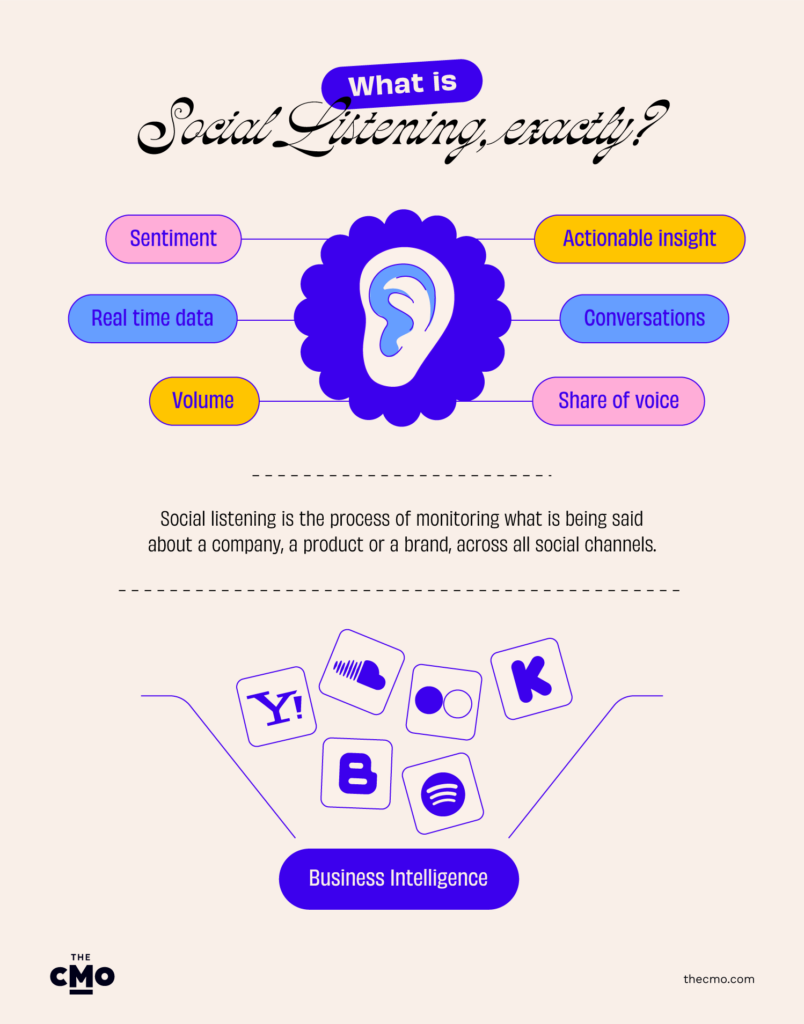Imagine your brand's reputation is facing a challenge on social media, a landscape where a single post can shift public perception dramatically. With Hootsuite reporting 4.2 billion people active on social media globally, the importance of managing your brand's online presence cannot be overstated.
In such a connected world, mistakes are bound to happen. However, how your company responds to these mistakes can be a defining moment. It can either reinforce customer loyalty or lead to significant loss.
This reality highlights the need for adept social media management tools and strategic responsiveness in safeguarding and enhancing your brand's image amidst the rapid dynamics of digital interactions. In this article, I’ll equip you with the knowledge to gain a competitive advantage by effectively managing your reputation and enhancing customer loyalty even when mistakes occur.

Combining Social Listening And Analytics For Reputation Management
In reputation management, merging your social listening tools with your social media analytics software plays a pivotal role. Engaging in social listening means actively exploring customer conversations, leading to insights that go beyond basic mentions and hashtags.
When harmonized with the extensive insights provided by social media analytics, this technique enables you to deeply understand your brand's reputation. It allows accurate identification of influential voices and precise measurement of public sentiment.
Adopting this integrated approach shifts your strategy from reactive to proactive and well-informed. Consequently, you can craft responses that genuinely connect with your audience, significantly bolstering and enhancing your brand's positive image.
10 Strategies To Leverage Social Media Analytics Software
It is essential to recognize the immense potential of social media analytics and use it to its fullest extent. The ten strategies I've outlined below aim to help you translate analytics data into actionable steps to improve your brand's relationship with customers and enhance its reputation.
- Real-Time Monitoring: Engage in immediate action by keeping a vigilant watch on social conversations. This approach allows you to quickly address negative feedback and capitalize on positive sentiment as it unfolds.
- Sentiment Analysis: Analyze the emotional undertones of social mentions to align your communication strategy with your audience's mood. This helps craft messages that resonate with the current sentiment, ensuring relevance and empathy.
- Influencer Engagement: Identify and collaborate with influencers to extend your brand's reach. Influencers can play a key role in mitigating negative sentiments and amplifying positive narratives about your brand. Listen to my conversation with social media expert Neal Schaffer as we share actionable strategies on my Doing CX Right podcast episode 42.
- Competitive Benchmarking: Use analytics to compare your brand's online presence with competitors. This strategy helps identify unique opportunities to enhance your brand's reputation and stand out in the market.
- Tailored Content Strategy: Develop a content marketing strategy informed by social listening insights. This ensures your messages are engaging and relevant and reinforces a positive brand image.
- Crisis Management: Monitor social media for early warning signs and prepare strategic responses in advance. Effective crisis management is critical to protecting your brand's reputation during challenging times.
- Customer Service Integration: Integrate customer service with your social media channels. Prompt and effective resolution of customer issues can turn potential negative experiences into positive ones.
- Feedback Loop: Show your customers their opinions matter by incorporating their feedback into your business strategies. This promotes continuous improvement and strengthens customer relationships.
- Product Development Insights: Use customer conversations on social media to inform your product development. Aligning your products with customer needs and preferences can lead to more successful offerings.
- Analytics Reporting: Regularly review your social media analytics to assess your social media ROI. Are you improving or declining? Use this data to make informed decisions and refine your approach for better results.
The Best Social Media Analytics Software
While the number of social media analytics software out there is extensive, some stand out for their effectiveness and robust features. Here are a few notable options that have been fully vetted by our team at The CMO:
- Brand24 — Best for social listening
- Agorapulse — Best for measuring ROI
- Rival IQ — Best for competitor analysis
- Sendible — Best for enterprise brands and agencies
- Cyfe — Best for customizable dashboards
The Best Social Listening Tools
As you navigate the digital landscape, social listening tools offer real-time data, trend analysis, and valuable customer insights to help understand your audience, make informed decisions, refine your marketing strategies, and gain a competitive edge. Here's a shortlist of some of our recommended options:
- Digimind — Best tool for growing teams
- Brand24 — Best cost-effective tool
- Agorapulse — Best user-friendly tool
- BuzzSumo — Best tool for startups
- YouScan — Best social listening tool for market researchers
10 Cautions: Avoiding Common Pitfalls In Social Media Reputation Management
While we've discussed proven strategies for using social media analytics software for reputation management, it's equally important to understand what NOT to do.
Employing digital solutions can significantly aid in maintaining and repairing your brand's reputation, but some pitfalls can undermine these efforts. The list below highlights additional warnings to consider:
1. Overlooking Small-Scale Conversations: Not paying attention to smaller, less obvious discussions about your brand might cause you to miss subtle yet crucial shifts in public opinion.
2. Focusing Solely on Quantitative Data: Depending too much on numerical metrics and neglecting the qualitative aspects of social conversations can result in a partial understanding of your brand's sentiment.
3. Reacting Emotionally to Criticism: Defensive or emotional responses to negative comments can exacerbate issues and damage your brand's reputation.
4. Inconsistent Engagement Across Platforms: A lack of uniform engagement across various social media platforms can lead to a cohesive and consistent brand presence.
5. Ignoring the Context of Conversations: Failing to consider the context of mentions can result in off-base or inappropriate responses.
6. Forgetting to Adapt to Platform-Specific Nuances: Treating all social media platforms identically and not adjusting to their distinct features and norms can lead to ineffective communication.
7. Neglecting Employee Training in Social Media Policies: Inadequate training of employees on your brand's social media guidelines can lead to inconsistent or harmful online interactions.
8. Overlooking Legal and Ethical Considerations: Engaging on social media without considering important legal and ethical issues, such as privacy laws and ethical marketing practices, can lead to complications.
9. Failure to Measure ROI of Social Media Efforts: Not monitoring the return on investment from your social media strategies can result in continued investment in non-productive tactics.
10. Ignoring Emerging Trends and Platform Updates: Not keeping up with the latest trends and updates in social media platforms can leave your strategies outdated and miss out on new opportunities.
These points cover common missteps in managing a brand's online presence and guide you to avoid them, ensuring your approach to reputation management remains effective.
Understanding and avoiding common pitfalls is essential for a successful and impactful social media reputation management strategy.
Responsible Reputation Management
In today's online world, getting a handle on social media analytics software is more than just a good idea—it's essential. It's a significant factor in shaping how people see your brand online.
We've looked at how mastering social listening and combining it with analytics can turn data into valuable tips and strategies. Key tasks like monitoring what's being said on social media, figuring out the feelings behind people's comments, connecting with influencers, and effectively managing crises are paramount.
Applying these techniques with the right solutions can lead to smarter planning and more creative handling of your brand's online image.
Remember that every interaction on social media can help improve how people see your brand and strengthen customer loyalty. This approach is more than just solving problems; it's about building an adaptable and trusted brand that people will keep coming back to and recommending.
For more tips and expert insights like this, be sure to subscribe to The CMO newsletter. You’ll receive the latest tips, resources, and guides from our community of seasoned marketing leaders straight to your inbox.



